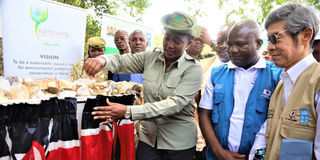How UNDP and FAO are contributing to Kenya’s drive to expand tree cover
Sponsored by UNDP

High-level launch of Kakamega Fencing and Conservation Project on February 24, 2023 by, from left: Cabinet Secretary for Environment, Climate Change and Forestry, Hon Soipan Tuya; Kakamega County Governor, H.E. FCPA Fernandes Barasa; and the Ambassador of Japan to Kenya, H.E Ken Okaniwa.
As the world marked the International Day of Forests on March 22, country representatives of two UN agencies in Kenya sent out messages of support to the government’s campaign to increase the country’s forest cover beyond the constitutional 10 percent. We publish their statements, which fundamentally outline their commitments to supporting the nation’s forest conservation, protection, and expansion activities.
UNDP remains committed to supporting the government’s ambition to achieve 30 percent tree cover by 2032
By Anthony Ngororano, Resident Representative, UNDP Kenya
UNDP Kenya congratulates the Government of Kenya for its forest conservation and restoration efforts.
Forests are an essential part of the country’s landscape, providing a range of ecosystem services that support human well-being and livelihoods. In addition to timber and non-timber forest products, they regulate the hydrological cycle, prevent soil erosion, and sequester carbon from the atmosphere.
As our planet faces crises that require urgent action, the United Nations Decade of Ecosystem Restoration provides a unique opportunity to restore degraded forests and other ecosystems, enhancing their ability to support human livelihoods and biodiversity conservation. This initiative can contribute significantly to global efforts to address climate change and the Sustainable Development Goals (SDGs).
Globally, UNDP supports countries to design, implement, and finance forest-based solutions to respond to the climate emergency, including REDD+ and other Nationally Determined Contributions (NDCs)-related efforts to conserve and sustainably manage forests. In Kenya, we remain committed to supporting the government’s ambition to achieve 30 percent tree cover by 2032. UNDP has implemented several programmes in the country to support sustainable and equitable development paths that lead to carbon neutrality.
We acknowledge the generous support from our partners, particularly the Government of Japan, which enabled the implementation of the catalytic Forest and Land Restoration Action for Kenya’s NDC (FLaRAK) project. This project has accelerated forest and land restoration in Kenya.
UNDP will continue to support such efforts to sustain resilient forest ecosystems that benefit local economies, protect biodiversity, and address the root causes of climate change through technical advisory, facilitating learning and south-south exchanges, designing innovative finance platforms as well as strengthening governance.
**********
Supporting Kenya’s drive to manage forests sustainably for healthier livelihoods
By Amb Carla Mucavi, Country Representative, FAO
Forests have been at the forefront of international discussions since the adoption of the 2030 Agenda for Sustainable Development and the Paris Agreement on Climate Change.
The 2023 theme for the International Day of Forests – “Forests and Health” – stressed the importance of forests and the forestry sector to human and environmental health. This includes aspects like prevention of emerging diseases, forest-derived medicinal products, recreation, and mental health benefits of forests, as well as the role of forest ecosystems for enhancing biodiversity.
The Food and Agriculture Organisation of the United Nations (FAO) is working very closely with the Kenya Forest Service, Kenya Forestry Research Institute, county governments and Community Forest Associations (CFAs), through various programmes, to support forest conservation and restoration.
We are promoting Tree Growers Associations across the country to support farm forestry as a crop. We are also implementing the Green Schools programme that provides support to learning institutions to establish tree nurseries and orchards.
FAO Kenya’s forest conservation efforts have been recognised globally. FAO’s conservation of Kirisia Forest in Samburu County is currently being publicised as a model for adoption by other countries.
FAO, in partnership with UNDP, UNCDF, and UNEP, with the leadership of the Ministry of Environment, Climate Change and Forestry, together with its agencies, have been developing the United Nations Joint Programme on Tree Growing and Sustainable Forestry Finance Management Programme (The Tree Growing Fund).
This fund will provide the missing financing link in restoration efforts to accelerate forestry and land restoration climate actions for the country to realise its ambitious National Tree Growing Campaign target of 15 billion trees by 2032.
In a related development, FAO and UNEP are coordinating the UN Decade on Ecosystem Restoration (2021-2030), which provides a unique opportunity to reverse the trend in landscape degradation from unsustainable practices, while securing ecosystem health for increased productivity of goods and services that are vital to climate and livelihood resilience.
FAO reaffirms its commitment for continued support to the Government of Kenya in its efforts to enhance sustainable forest management for healthy livelihoods.


